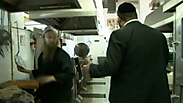
Sounds good. If you accept that it is the state's job to act as the provider of a seal of approval on kashrut, it's a positive step that brings some order to a confused situation. But is it really the state's job? In a country that is not – at least in theory – a halachic state, should the authorities provide halachic seals of approval? And not just any old seals of approval, but seals of approval with Michelin stars?
I understand that in the army or in the Israel Prison Service the state must provide its own seal of approval, as we are talking about a "captive audience," which cannot choose between alternatives on its own. But in the free market? Each person should have the honor of deciding what suits him, at his own expense.
Does he find the kosher certification of a certain rabbi insufficient? Then he should find a restaurant serving food with a kosher certification from a different rabbi. Does he find sufficient the business owner's declaration that the food he serves is kosher, without a rabbi's approval? Good for him. This is all between the consumer and the supplier, and between the consumer and God.
I would not be discussing this issue if it were not for another huge, inflated and expensive system that includes supervisors and supervisors' supervisors and clerks and assistants, all at the taxpayer's expense. Naftali Bennett, who heads the Ministry of Religious Services, is a strong believer in breaking monopolies, but not when it comes to one of the biggest among them – the Chief Rabbinate, a system that illustrates remarkably how the lack of competition creates inefficiency and corruption.
The particularly annoying thing about this governmental company is that it's unclear who it serves. Even if one accepts the indecent arrangement, under which the State of Israel forfeited marriage and divorce registration to the rabbinical establishment, it's unclear how this service generated the huge system of religious councils and city rabbis, whose contribution to the peace of the non-religious public in Israel is unclear, but whose cost is completely clear.
To put things in proportion, it's worth mentioning an issue which made headlines recently: In the entire State of Israel there are seven(!) fumigation inspectors. On a matter of life and death, the State offers its citizens poor and miserable service. The Environmental Protection Ministry fails to provide the inspectors with suitable vehicles, and they are forced to use public transportation to get from place to place, meaning that even these magnificent seven are unavailable much of the time.
In the fields of sanitation and environmental protection as well, there is a serious shortage of inspectors and real law enforcement problems. So in areas with a direct influence on public health, there is neither manpower nor authorities.
Things are different when it comes to protecting the public's Jewishness. It's a matter of priorities. There is no shortage of jobs for our people, and from now the authorities will be expanded as well. The inspectors will be able to go into a business or factory, demand to see the identity card of every person, as well as deliver every piece of information or document relevant to law enforcement, take samples of products and substances and have them checked, and even confiscate invalid kashrut certificates.
It's kosher with three Stars of David, if only it didn't stink so much.
















